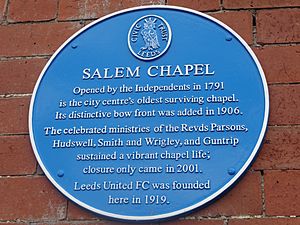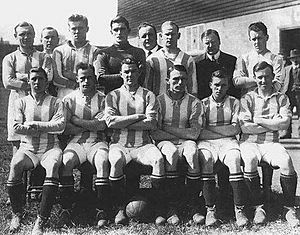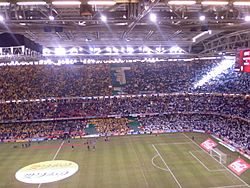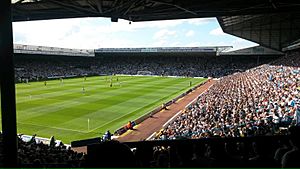Leeds United F.C. facts for kids
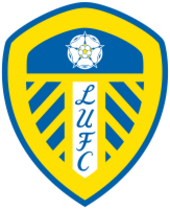 |
|||
| Full name | Leeds United Football Club | ||
|---|---|---|---|
| Nickname(s) | The Whites, The Peacocks | ||
| Founded | 17 October 1919 | ||
| Ground | Elland Road | ||
| Capacity | 37,645 | ||
| Owner | 49ers Enterprises | ||
| Chairman | Paraag Marathe | ||
| Manager | Daniel Farke | ||
| League | Championship | ||
| 2018–19 | Championship, 3rd of 24 | ||
|
|
|||
Leeds United Football Club is a professional football team from Leeds, West Yorkshire, England. They play in the Premier League, which is the top football league in England.
Leeds United has won many trophies, including the League Championship three times. They have also won the FA Cup once, the League Cup once, and the Inter-Cities Fairs Cup twice. Their most successful time was in the 1960s and 1970s under manager Don Revie. During this period, they won many of their major titles.
The team's traditional colours are white shirts, white shorts, and white socks. Their badge features the White Rose of York, a symbol of Yorkshire. Leeds United has strong rivalries with Manchester United and Chelsea.
Contents
Club History: From Beginnings to Today
How Leeds United Started
Before Leeds United, there was a team called Leeds City. It was formed in 1904 but was later closed down in 1919 due to some issues. Leeds United was then created in 1919. They took over the Elland Road stadium, which is still their home ground today.
Huddersfield Town chairman Hilton Crowther helped Leeds United get started by lending them money. He also brought in Arthur Fairclough as the new manager in 1920.
Early Years: 1920–1960
Leeds United joined the Football League in 1920. They won the Second Division title in 1924, earning promotion to the First Division. However, they struggled to stay there and were relegated a few times. Each time, they managed to get promoted back up the next season.
Managers like Dick Ray and Billy Hampson led the team during these years. After World War II, Leeds faced more challenges and were relegated again in 1947. They stayed in the Second Division until 1956, when they were promoted again, thanks to star player John Charles. Charles later moved to Juventus for a world-record fee. Leeds was relegated back to the Second Division in 1960.
The Don Revie Era: 1961–1974
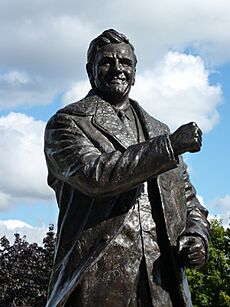
In 1961, former player Don Revie became manager. The club was having financial problems, but Revie changed things around. He focused on young players and changed the team's kit to all-white, like Real Madrid. Leeds United won promotion to the First Division in 1964.
Under Revie, Leeds became one of the best teams in England. They finished second in the league twice and reached the 1965 FA Cup final in 1965, losing to Liverpool. They also reached the semi-finals of the Inter-Cities Fairs Cup.
In 1968, Leeds won their first major trophy, the League Cup, beating Arsenal 1–0. They also won the Inter-Cities Fairs Cup that year. In 1969, Leeds won the First Division title, setting records for points and fewest defeats. They even had a 34-match unbeaten run!
Leeds continued to challenge for trophies, signing Allan Clarke for a British transfer record. They won the Inter-Cities Fairs Cup again in 1971 and the FA Cup in 1972. In 1974, Leeds won the First Division title for the second time. Don Revie then left to become the England manager.
Revie's time was incredibly successful, bringing many trophies and high finishes for Leeds United.
After Revie: 1974–1988
After Don Revie left, Brian Clough became manager, but he only stayed for 44 days. Jimmy Armfield then took over and led the team to the European Cup final in 1975, where they lost to Bayern Munich.
Leeds remained a top team for a few more seasons but eventually declined. They were relegated in 1982. Former players like Eddie Gray and Billy Bremner tried to manage the team. In 1987, Leeds reached the play-off final but lost to Charlton Athletic.
Wilkinson, Graham, and O'Leary: 1988–2002
In 1988, Howard Wilkinson became manager. He helped Leeds avoid relegation and then led them to win the Second Division in 1990, getting promoted back to the First Division. In 1992, Leeds became champions of England for the third time!
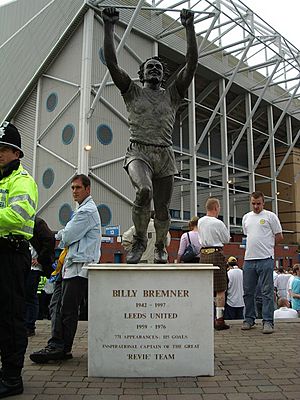
Leeds was a founding member of the new Premier League in 1992. Wilkinson left in 1996. The club's youth academy, developed under Wilkinson, produced many talented players.
George Graham then managed the team, helping them qualify for the UEFA Cup. In 1998, David O'Leary took over. Under O'Leary, Leeds consistently finished in the top five of the Premier League and had exciting runs in European competitions like the UEFA Cup and UEFA Champions League.
Financial Challenges and Relegation: 2002–2010
Leeds United faced big financial problems in the early 2000s. They had borrowed a lot of money, expecting to earn more from Champions League football. When they didn't qualify for the Champions League for two seasons in a row, they couldn't repay the loans.
This led to selling key players like Rio Ferdinand and Jonathan Woodgate. Managers like Terry Venables and Peter Reid tried to help, but the club was relegated in 2004. Kevin Blackwell became manager, and the club had to sell its training ground and even its stadium, Elland Road, in 2004.
In 2005, Ken Bates bought the club. Under Blackwell, Leeds reached the Championship play-off final in 2006 but lost. In 2007, Leeds went into administration, which meant they were officially relegated to the third tier of English football for the first time in their history.
Despite a 15-point deduction, Leeds reached the play-off final in 2008 but lost again. In 2010, under manager Simon Grayson, Leeds finally won promotion back to the Championship, beating Manchester United in the FA Cup along the way.
Return to the Championship and Premier League: 2010–Present
Leeds spent many seasons in the Championship. In 2012, GFH Capital took over the club, and then in 2014, Massimo Cellino became the owner. There were many changes in managers during this time.
In 2017, Andrea Radrizzani bought a 50% stake, and then full ownership of the club. He also bought back Elland Road, making it owned by the club again. In 2018, 49ers Enterprises, linked to the San Francisco 49ers American football team, became a minority investor.
Marcelo Bielsa was appointed manager in 2018. He became the highest-paid manager in the club's history. Under Bielsa, Leeds played exciting football and came very close to promotion in his first season.
On 17 July 2020, after sixteen years, Leeds United were promoted back to the Premier League! They finished as champions of the Championship, ten points clear of second place. Their first season back in the Premier League was very successful, finishing in the top half of the table.
However, the next season was tougher. Bielsa left in February 2022 and Jesse Marsch took over, helping the club avoid relegation on the final day. Marsch was replaced by Javi Gracia in February 2023, and then Sam Allardyce in May 2023. Unfortunately, Leeds were relegated back to the Championship at the end of the 2022-23 season.
Daniel Farke became manager on 4 July 2023. In July 2023, 49ers Enterprises completed a full takeover of the club. In their first season back in the Championship, Leeds reached the play-off final but lost. However, the club showed strong financial growth.
The 2024–25 season was a great success! After a strong run of results, including a 7–0 win over Cardiff City, Leeds United secured automatic promotion back to the Premier League on 21 April. They then went on to win the Championship title on the final day of the season.
Team Colours and Badge
Evolution of Leeds United's Kit Colours
In their first 15 years, Leeds United's kit looked like Huddersfield Town's, with blue and white striped shirts. This was because the chairman of Huddersfield Town wanted to merge the two clubs.
In 1934, Leeds changed to blue and yellow shirts with white shorts. In the 1950s, they tried yellow shirts with blue sleeves. Then in 1955, they switched to royal blue shirts with gold collars, similar to the original Leeds City colours.
A big change happened in 1961 when Don Revie introduced the famous all-white strip, which the team still wears today.
The Leeds United Badge
Leeds United's first badge in 1934 featured the coat of arms of Leeds. After 1961, the all-white shirts sometimes had no badge at all.
In 1964, an owl badge was added. The owl comes from the three owls on the city's coat of arms. This owl was usually navy blue but was gold for the 1968 League Cup Final.
From 1971 to 1973, the badge showed "LUFC" written diagonally. In 1973, the famous "smiley" badge appeared, made of the letters L and U in a bubbly style. This badge was very modern for its time.
Later badges included a stylised peacock (referring to the club's nickname, "The Peacocks") and then a design with the White Rose of York and a football, using the traditional blue, gold, and white colours. Since 1998, the badge has been a shield design with the white rose and "LUFC" written vertically.
Home Stadium: Elland Road
Leeds United has always played at Elland Road since the club was founded in 1919. It's an all-seater stadium in Beeston, Leeds, and is one of the largest football stadiums in England.
Elland Road was first used by Leeds City. After Leeds United was formed, they rented the stadium and later bought it. The stadium was owned by the local council for many years, but the club bought it back in 2017.
One of Leeds' nicknames, "The Peacocks," comes from the original name of Elland Road – "The Old Peacock ground." This was named after a nearby pub. The stadium has several stands, including the East Stand, which is the largest, and The Don Revie Stand. There have been plans to make the stadium even bigger in the future.
Passionate Supporters
Leeds United fans are known for their strong support. Former managers have often praised the fans, saying they are "fantastic" and "will follow them everywhere."
Leeds United supporters love to sing their signature song, "Marching on Together", before and during matches. Another popular song is "We Are The Champions, Champions of Europe," which refers to the 1975 European Cup Final.
There are also various fan groups, including an LGBT fans' group called Marching Out Together, a group for Sikh supporters called Punjabi Whites, and the Leeds United Disabled Organisation (LUDO).
Rivalries on the Pitch
Leeds United's biggest rivals are Manchester United. This rivalry goes back a long way, even to the historic "Wars of the Roses" between Yorkshire and Lancashire. On the football field, the rivalry became very strong in the 1960s with managers Don Revie and Matt Busby.
Games between Leeds and Manchester United are known for being very intense. Players like Johnny Giles, Gordon Strachan, and Eric Cantona have played for both clubs.
Leeds United also has a rivalry with Chelsea. This rivalry grew from big matches in the 1970s, especially the 1970 FA Cup Final. The teams also competed at the top of the Premier League in the late 1990s and early 2000s, leading to many competitive games.
Club Music
In April 1972, a song called "Leeds United" was released when the team reached the 1972 FA Cup final. The team members even sang on the record! The B-side of that song, "Leeds! Leeds! Leeds!" (also known as Marching on Together), has become the club's official anthem and is sung by fans at every match.
Club Records and Achievements
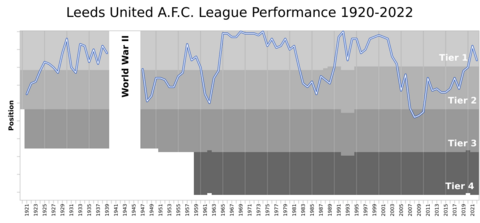
Jack Charlton holds the record for the most appearances for Leeds United, playing 773 games between 1952 and 1973. Peter Lorimer is the club's top goal scorer, with 238 goals. John Charles scored the most goals in a single season, with 43 goals in 1953–54.
The record for the highest attendance at Elland Road is 57,892, set in a match against Sunderland in 1967.
Leeds United's highest league finish is first place in the First Division, which they achieved three times: in 1969, 1974, and 1992. Their lowest league finish was fifth in League One in 2008.
The club's longest unbeaten run in the league was 34 games, from October 1968 to August 1969, when they won the First Division title. They also have a record of nine consecutive victories in the league, achieved twice.
Meet the Players
First-team squad
|
|
Players Out on Loan
|
Under-21s and Academy
Club Management
First-team Staff
| Position | Staff |
|---|---|
| First team manager | Daniel Farke |
| Assistant manager | Eddie Riemer |
| First team coach | Christopher John |
| Performance coach | Chris Domogalla |
| Goalkeeper coach | Ed Wootten |
| Loans manager | Andrew Taylor |
Medical Team
| Position | Staff |
|---|---|
| Head of medicine | Henry McStay |
| Lead first team physio | Daryl Carter |
| Rehab and fitness conditioning coach | Rubén Crespo |
| Sports scientist | Tom Robinson |
| Senior first team physio | Billy Atton |
| Junior assistant physio | Sam Callaghan |
| Sports therapist | Aimee Last |
| Club doctor | Rishi Dhand |
| Performance nutritionist | Elise McVicar |
Scouting and Recruitment Team
| Position | Staff |
|---|---|
| Head of recruitment | Alex Davies |
| Head of football administration | Hannah Cox |
| Head of emerging talent | Craig Dean |
| Technical scout | Josh Hobbs |
| Technical scout | Callum Cooke |
| European scout | Dorian Dervite |
| European scout | Guy Ipoua |
Owners and Directors
| Leeds United Football Club Limited ('LUFC') owners | 49ers Enterprises |
| Honorary president | David Lascelles, 8th Earl of Harewood |
| Chairman | Paraag Marathe |
| Vice chairman | Andrew Schwartzberg |
| Executive vice chairman | Peter McCormick |
| Director | Peter Lowy |
| Director | Eugene Schneur |
| Chief business officer | Morrie Eisenberg |
| Chief financial officer | Fay Greer |
| Managing director | Robbie Evans |
| Sporting director | Adam Underwood |
Club Managers
Daniel Farke is the current manager of Leeds United. The most successful manager in the club's history is Don Revie. He led the team for 13 years (1961–1974) and won many major trophies, including two First Division titles and two Inter-Cities Fairs Cups. He managed 740 games, more than anyone else.
Club Honours: Trophies and Titles
Domestic Competitions
League Titles
- First Division (top league)
- Champions: 1968–69, 1973–74, 1991–92
- Runners-up: 1964–65, 1965–66, 1969–70, 1970–71, 1971–72
- Second Division / Championship (second league)
- Champions: 1923–24, 1963–64, 1989–90, 2019–20, 2024–25
- Runners-up: 1927–28, 1931–32, 1955–56
- League One (third league)
- Runners-up: 2009–10
Cup Competitions
- FA Cup
- Winners: 1971–72
- Runners-up: 1964–65, 1969–70, 1972–73
- League Cup
- Winners: 1967–68
- Runners-up: 1995–96
- FA Charity Shield
- Winners: 1969, 1992
- Runners-up: 1974
European Competitions
- European Cup
- Runners-up: 1974–75
- European Cup Winners' Cup
- Runners-up: 1972–73
- Inter-Cities Fairs Cup
- Winners: 1967–68, 1970–71
- Runners-up: 1966–67
- Inter-Cities Fairs Cup Trophy play-off
- Runners-up: 1971
See also
 In Spanish: Leeds United Football Club para niños
In Spanish: Leeds United Football Club para niños


